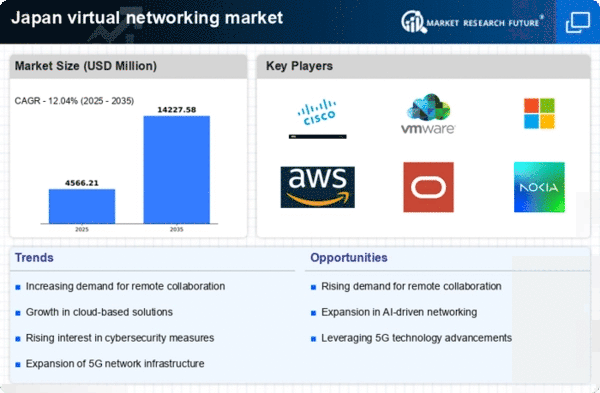Rising Cybersecurity Concerns
Rising cybersecurity concerns significantly influence the virtual networking market in Japan. As businesses increasingly rely on digital platforms for communication and collaboration, the threat of cyberattacks becomes more pronounced. In 2025, it is projected that cybercrime costs in Japan will exceed $30 billion, prompting organizations to prioritize cybersecurity measures. This heightened awareness drives the demand for virtual networking solutions that incorporate advanced security features, such as encryption and multi-factor authentication. Consequently, companies are more inclined to invest in virtual networking technologies that not only facilitate connectivity but also safeguard sensitive data. The focus on cybersecurity is likely to shape the evolution of the virtual networking market, as providers enhance their offerings to address these critical concerns.
Emergence of Hybrid Work Models
The emergence of hybrid work models significantly impacts the virtual networking market in Japan. As organizations adopt a blend of in-office and remote work arrangements, the demand for versatile virtual networking solutions grows. In 2025, it is anticipated that around 70% of Japanese companies will implement hybrid work strategies, necessitating tools that facilitate seamless collaboration across diverse work environments. This shift encourages the development of virtual networking technologies that support both in-person and remote interactions, ensuring that teams remain connected regardless of their physical location. The rise of hybrid work models is likely to drive innovation within the virtual networking market, as providers strive to meet the evolving needs of businesses navigating this new landscape.
Advancements in Network Infrastructure
Japan's virtual networking market benefits from significant advancements in network infrastructure. The country boasts one of the most developed telecommunications networks globally, with high-speed internet access reaching over 95% of households. This robust infrastructure supports the increasing demand for virtual networking solutions, enabling businesses to leverage high-bandwidth applications and services. As organizations seek to optimize their operations, the integration of advanced networking technologies, such as 5G and fiber-optic connections, enhances the performance and reliability of virtual networking tools. The ongoing investments in infrastructure development are expected to further stimulate the virtual networking market, as companies capitalize on improved connectivity to enhance their digital transformation initiatives.
Growing Demand for Remote Work Solutions
The virtual networking market in Japan experienced a notable surge in demand for remote work solutions. As organizations increasingly adopt flexible work arrangements, the need for reliable and efficient virtual networking tools becomes paramount. In 2025, it is estimated that approximately 60% of Japanese companies will implement remote work policies, driving the adoption of virtual networking technologies. This shift necessitates robust platforms that facilitate seamless communication and collaboration among remote teams. Consequently, the virtual networking market is poised for growth, as businesses seek to enhance productivity and maintain connectivity in a distributed work environment. The emphasis on remote work solutions is likely to propel innovations in virtual networking, leading to the development of more sophisticated tools tailored to the unique needs of remote employees.
Increased Investment in Digital Transformation
The virtual networking market in Japan is experiencing a boost due to increased investment in digital transformation initiatives. As organizations recognize the importance of adapting to the digital landscape, they allocate substantial resources to upgrade their networking capabilities. In 2025, it is estimated that Japanese companies will invest over $50 billion in digital transformation projects, which include the adoption of virtual networking solutions. This trend reflects a broader commitment to enhancing operational efficiency and customer engagement through technology. As businesses seek to modernize their infrastructure, the virtual networking market stands to benefit from this influx of investment, leading to the development of innovative solutions that cater to evolving business needs.
















